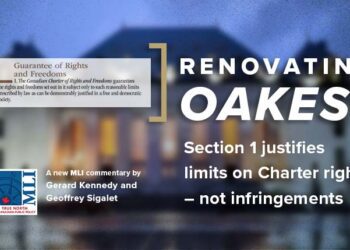Christopher Moore published this helpful review of Dennis Baker’s book in the Law Times:
Judges act. That’s why they call it the rule of law. Complaints about “judicial activism” often look like an attempt to cast a cloak of principle over sour grapes. Those who complain of judges being out of control often seem mostly to be wishing that they would have decided things differently.
Dennis Baker does fear courts are getting out of control. But he’s not interested in comparing courts whose judgments he dislikes to those of which he approves. Courts have become too assertive, he suggests. But his solution is to encourage a more active response from legislatures and executives.
In a cogent new book, Not Quite Supreme, Baker does not seek to bully or cajole courts out of their activism. He would let judges judge; he just wants to see some pushback from other constitutional actors.
Baker, a poli-sci prof and political philosopher, is a balance-of-power theorist. The Canadian constitution and political tradition, he argues, is based on a separation of powers that is not total, but remains real. Courts, legislatures, and governments all have their spheres, overlapping but still distinguishable. Each should prevent the other from seizing unchecked power. It follows, Baker argues, that this balance depends on no element acquiring a “trumping” power, one that enables it to take over the functions of the others.
Lately, he suggests, courts have begun to invade the spheres of the other branches of the state. Worse, he suggests, many scholars of constitutional law accept and celebrate the courts’ invasion of the legislative and executive roles. Baker suggests these “judicial supremacists” do want the courts to wield a trumping power to which he believes no agency should be entitled.
Baker does not propose that governments or legislatures should simply ignore the rulings of courts. But he notes that traditionally the role of courts has been to rule on “cases and controversies” – specific cases on particular circumstances brought by unique litigants. Courts have neither the capacity of legislatures to frame general laws nor the institutional competence to administer their application.
Greatly to oversimplify Baker’s argument, he suggests there is a place for legislatures to assert their authority over general law and governments to assert their administrative responsibility – particularly in the face of single court judgments that may well prove to be outliers. He suggests there should legitimately be ways for legislatures to defend their lawmaking powers and for governments to defend their spending and administrative powers against the decrees of courts — particularly against lower court rulings and split decisions that might well be reversed elsewhere.
Baker acknowledges that an ongoing series of judicial decisions, case after case after case, must eventually shape what governments and legislatures can do. But he thinks most “dialogue theorists” are too deferential to courts when they argue that political actors have no legitimate riposte to courts other than the notwithstanding clause. Baker proposes “the minority retort” and “the textual retort” as plausible strategies by which legislatures and governments can engage in a creative and appropriate struggle with courts.
Baker also considers one possible reason why so many constitutional theorists support “judicial supremacy.” He acknowledges that, as the Supreme Court once said, today in Canada “except in certain rare cases, the executive frequently and de facto controls the legislature.” (Baker, p. 64) He suggests “the orthodoxy” supports judicial power as the only possible counterweight to executive dominance in the era of trained-seal backbenchers. He implies, however, that if the legislature is failing in its role, the solution should be sought in the legislature, not in transferring legislative and executive powers to courts with neither the skills nor the right to exercise them.
Baker has an LLB as well as a PhD but one might guess his theory will not be warmly welcomed either in law schools or in judges’ chambers. It might get a more sympathetic reading, however, in government offices and legislatures. Which is where he expects the pushback to come from.
Dennis Baker’s Not Quite Supreme: The Courts and Coordinate Constitutional Interpretation was published this year by McGill-Queen’s University Press.
Christopher Moore’s newest book is The British Columbia Court of Appeal: The First Hundred Years, published by UBC Press and the Osgoode Society. www.christophermoore.ca
[From The Idea file]
Posted by Janet Ajzenstat




